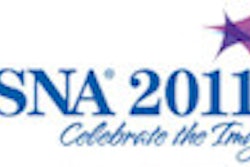Leading European research groups still target the annual RSNA congress in a major way, and our editorial team has been onsite in Chicago this week to bring you details about the studies that have been making the news in the Windy City.
Knee surgical techniques have developed rapidly over the past decade, and orthopedic surgeons now rely heavily on the rich clinical information provided by MRI. Radiologists from Zurich have focused on the postoperative aspects, which tend to get neglected. They provided some practical advice and pointers in their stunning education exhibit. Click here for our article.
Evidence shows that coronary artery calcium scoring has a great ability to predict future cardiac events, but it falls short of coronary CT angiography for predicting the presence of obstructive disease in patients with acute chest pain, researchers from Italy have found. Visit our CT Digital Community, or get the story here.
If European attendees at RSNA had hoped to escape the current wave of economic austerity sweeping across the continent, then they've probably been disappointed. These are tough times, and the regulators now impose ever stricter rules, so companies have cut back on hospitality and parties this year. Click here for details.
But it's by no means all doom and gloom. The central theme of RSNA is Celebrate the Image, and in his opening address, congress president Dr. Burton Drayer concentrated on how radiology has spurred breakthroughs in medicine, enabling earlier and more accurate disease detection and interventional therapies. Click here for staff writer Rebekah Moan's report.
Diagnostic reference levels for nuclear medicine in Germany have come under close scrutiny, and appear to have had relatively little impact on clinical practice. Find out more here.
Much more news from RSNA is available on our sister site, AuntMinnie.com. Click here for the RADCast from the meeting. Also, watch out for further news over the coming weeks.
Finally, our first two dual-language case reports have now been published. If you have Italian and Spanish colleagues who prefer to read in their own language, please do urge them to click on the flags at the top of our home page.


















